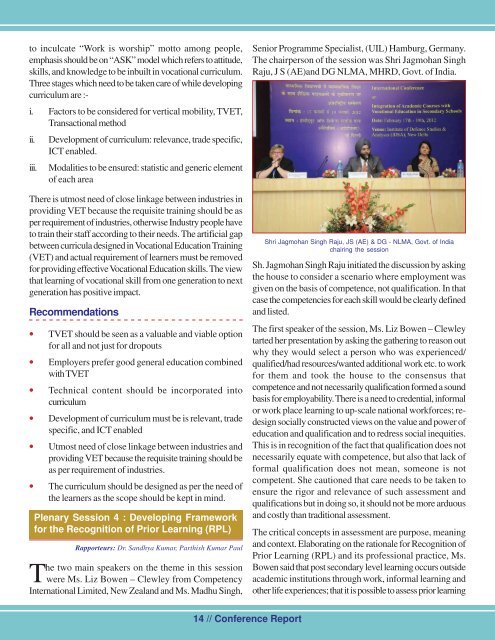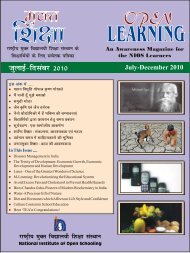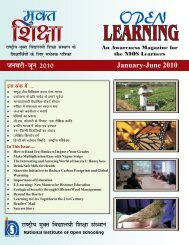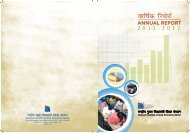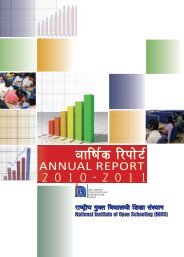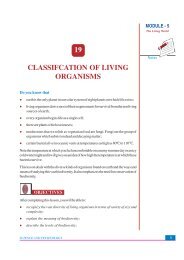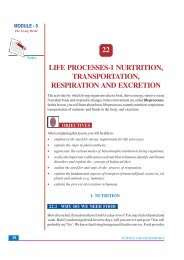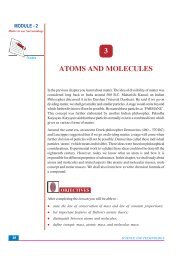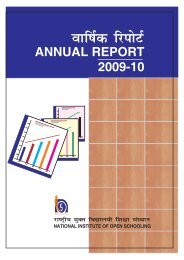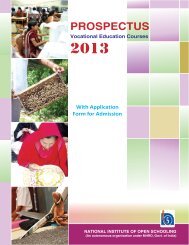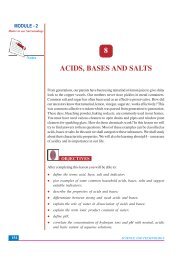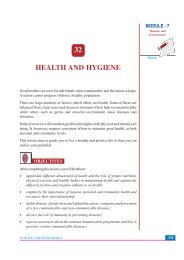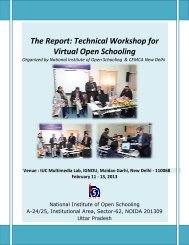Conference Report - The National Institute of Open Schooling
Conference Report - The National Institute of Open Schooling
Conference Report - The National Institute of Open Schooling
You also want an ePaper? Increase the reach of your titles
YUMPU automatically turns print PDFs into web optimized ePapers that Google loves.
to inculcate “Work is worship” motto among people,<br />
emphasis should be on “ASK” model which refers to attitude,<br />
skills, and knowledge to be inbuilt in vocational curriculum.<br />
Three stages which need to be taken care <strong>of</strong> while developing<br />
curriculum are :-<br />
i. Factors to be considered for vertical mobility, TVET,<br />
Transactional method<br />
ii.<br />
iii.<br />
Development <strong>of</strong> curriculum: relevance, trade specific,<br />
ICT enabled.<br />
Modalities to be ensured: statistic and generic element<br />
<strong>of</strong> each area<br />
<strong>The</strong>re is utmost need <strong>of</strong> close linkage between industries in<br />
providing VET because the requisite training should be as<br />
per requirement <strong>of</strong> industries, otherwise Industry people have<br />
to train their staff according to their needs. <strong>The</strong> artificial gap<br />
between curricula designed in Vocational Education Training<br />
(VET) and actual requirement <strong>of</strong> learners must be removed<br />
for providing effective Vocational Education skills. <strong>The</strong> view<br />
that learning <strong>of</strong> vocational skill from one generation to next<br />
generation has positive impact.<br />
Recommendations<br />
• TVET should be seen as a valuable and viable option<br />
for all and not just for dropouts<br />
• Employers prefer good general education combined<br />
with TVET<br />
• Technical content should be incorporated into<br />
curriculum<br />
• Development <strong>of</strong> curriculum must be is relevant, trade<br />
specific, and ICT enabled<br />
• Utmost need <strong>of</strong> close linkage between industries and<br />
providing VET because the requisite training should be<br />
as per requirement <strong>of</strong> industries.<br />
• <strong>The</strong> curriculum should be designed as per the need <strong>of</strong><br />
the learners as the scope should be kept in mind.<br />
Plenary Session 4 : Developing Framework<br />
for the Recognition <strong>of</strong> Prior Learning (RPL)<br />
Rapporteurs: Dr. Sandhya Kumar, Parthish Kumar Paul<br />
<strong>The</strong> two main speakers on the theme in this session<br />
were Ms. Liz Bowen – Clewley from Competency<br />
International Limited, New Zealand and Ms. Madhu Singh,<br />
Senior Programme Specialist, (UIL) Hamburg, Germany.<br />
<strong>The</strong> chairperson <strong>of</strong> the session was Shri Jagmohan Singh<br />
Raju, J S (AE)and DG NLMA, MHRD, Govt. <strong>of</strong> India.<br />
Shri Jagmohan Singh Raju, JS (AE) & DG - NLMA, Govt. <strong>of</strong> India<br />
chairing the session<br />
Sh. Jagmohan Singh Raju initiated the discussion by asking<br />
the house to consider a scenario where employment was<br />
given on the basis <strong>of</strong> competence, not qualification. In that<br />
case the competencies for each skill would be clearly defined<br />
and listed.<br />
<strong>The</strong> first speaker <strong>of</strong> the session, Ms. Liz Bowen – Clewley<br />
tarted her presentation by asking the gathering to reason out<br />
why they would select a person who was experienced/<br />
qualified/had resources/wanted additional work etc. to work<br />
for them and took the house to the consensus that<br />
competence and not necessarily qualification formed a sound<br />
basis for employability. <strong>The</strong>re is a need to credential, informal<br />
or work place learning to up-scale national workforces; redesign<br />
socially constructed views on the value and power <strong>of</strong><br />
education and qualification and to redress social inequities.<br />
This is in recognition <strong>of</strong> the fact that qualification does not<br />
necessarily equate with competence, but also that lack <strong>of</strong><br />
formal qualification does not mean, someone is not<br />
competent. She cautioned that care needs to be taken to<br />
ensure the rigor and relevance <strong>of</strong> such assessment and<br />
qualifications but in doing so, it should not be more arduous<br />
and costly than traditional assessment.<br />
<strong>The</strong> critical concepts in assessment are purpose, meaning<br />
and context. Elaborating on the rationale for Recognition <strong>of</strong><br />
Prior Learning (RPL) and its pr<strong>of</strong>essional practice, Ms.<br />
Bowen said that post secondary level learning occurs outside<br />
academic institutions through work, informal learning and<br />
other life experiences; that it is possible to assess prior learning<br />
14 // <strong>Conference</strong> <strong>Report</strong>


